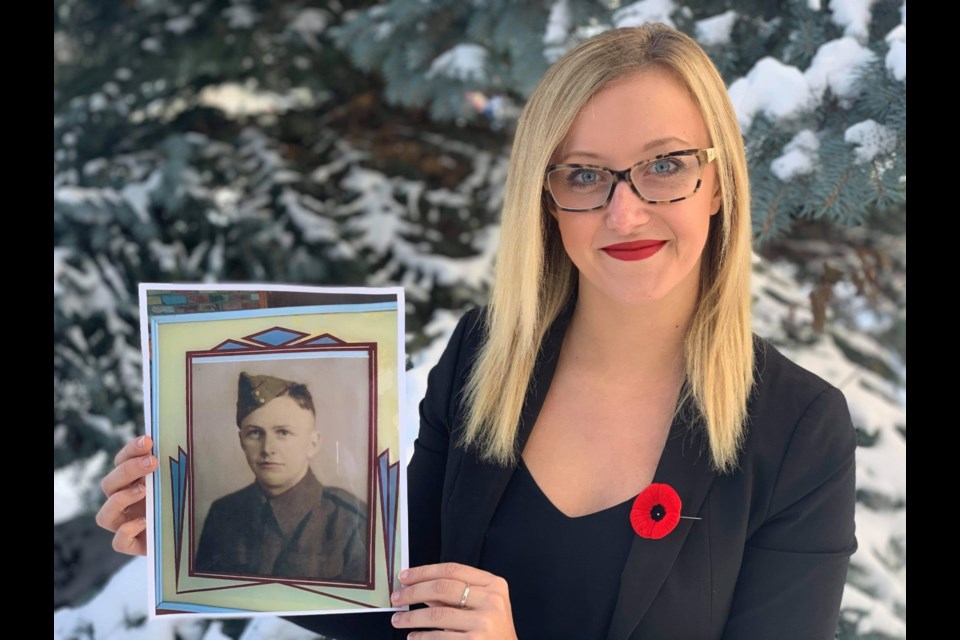KANANASKIS – Banff-Kananaskis MLA Miranda Rosin’s family history offers a rich look into the complexities of war.
During the Second World War, she had two great great uncles placed in internment camps in Kananaskis and Ontario. At the same time, another great uncle was in Normandy serving as a scout for D-Day.
“My family’s played quite an interesting role in the war," Rosin said. "Some of them were on the front lines, some of them were captured and suspected of war crimes.
“The wars have a pretty interesting and special place in our family – we’ve kind of been on both sides.”
Her grandma Verna Rosin, maiden name Wildeman, was the daughter of German immigrants, but was born and raised in Canada.
Verna had two uncles spend time in the prisoner of war camps during the Second World War, one of which was the Kananaskis Internment Camp.
Her great great uncle Robert Wildeman was living in Esk, Sask. a “small little town” with his wife and six children running a Blacksmith shop when the Second World War broke out.
“They stormed his blacksmith shop one day and they just took him away with no warning,” Rosin said. “He was taken off to Kananaskis and he spent three years there, while his wife and six kids were left on the farm behind in Esk.”
The community rallied around the family and supported them while Robert was gone, she said, helping them survive until he was able to return home.
“They were told, when he was taken, that he was suspected of being a German spy,” Rosin said.
While it remains unclear why he was accused of working with the Germans, Rosin said she suspects it was because he was a German immigrant who was new to the country.
“He wasn’t a spy,” Rosin said. “Nobody really knows what it was that had two family members taken to camps.”
The Kananaskis Interment camp had a better reputation than the other facilities in the country, she said, but Robert just wanted to go home after being stolen from his family.
Rosin said the family does not know much about Roberts's experience at the internment camp. Her grandmother and other family members would often ask about his time there, but Robert was tight-lipped about the experience.
“He never wanted to talk about it. It’s a bit of a mystery,” Rosin said.
At the same time Robert was imprisoned in the Kananaskis Internment Camp, Rosin’s great uncle Bill Wildeman was conscripted into the Canadian military at the age of 19.
“My uncle Bill was in Normandy on D-Day,” Rosin said. “He was not only on the front line, but he was also a scout. He very easily could have been the first one picked off.”
Rosin explained that Bill was one of the few people sent out ahead of the troops to risk his life and ensure the path was clear so the Normandy invasion would be a success.
By what her family describes as a “miracle of God,” Bill made it home alive, but he was left with severe trauma from the war.
The family would ask him for details about the day, but he would only tell the family, “How would you feel if a best friend dropped dead beside you?”
“He won’t talk about his experience because he’s so traumatized from what went on that day,” Rosin said.
Bill did his best to cope with the memories of war when he returned home, Rosin said, but several months after returning to Canada he collapsed outside a grocery store because he had severe ulcers and blood loss from the PTSD and stress he had experienced.
“It took a physical toll on his body,” Rosin said.
She noted that on her grandfather's side, she has Jewish roots, including ancestors who were not able to make it to Canada. Some are presumed to have died in the Holocaust.
“The war touches everyone and we look back on history with a very tainted lens of certain groups of people, certain populations, certain races,” Rosin said. “There was a lot of good people who got caught up in the war unfairly like my great uncle did. People who were suspected of crimes who may not have been guilty of them.”
Rosin said she encourages people when they look back on history to do their research and work to hear all sides of a story while respecting the effects the world wars have had on everyone's lives.
“Everybody’s family probably has ties to them somewhere,” Rosin said. “They're such an important piece of our history and really, truly we would not be here today, we wouldn’t have the freedoms we have, we wouldn’t have this incredible country, the economy, anything that we have today, if it hadn’t been to the people who fought in the war."
For Rosin, her rich family history demonstrates the complexities of the war and the impact it has on families.
“There are a lot of questions in my family as to why one uncle from the same family was on the front lines of Normandy, while the other uncles were shipped off to prisoners of war camps,” Rosin said. “Neither of them were lucky, one of them got to represent the country, but he came back traumatized. The other one didn’t have to go to war, but he was torn away from his family for three years.”




